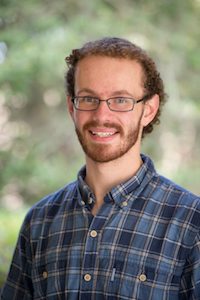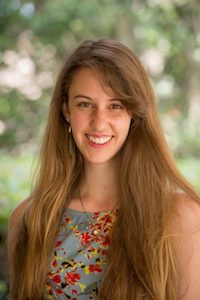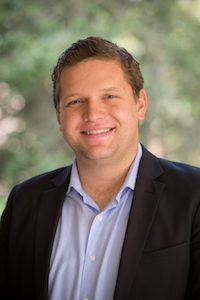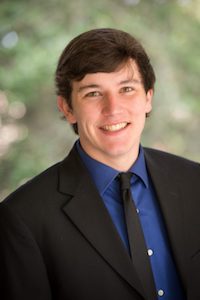Westmont Magazine Four Seniors Tie for Top Academic Award
Four 2016 graduates earned perfect grade point averages and received the faculty scholarship award at commencement.
Computer Scientist Immersed Himself in Theater Arts
 Dillon Montag, a mathematics and computer science double major, is the Kim P. Kihlstrom Outstanding Graduate for 2016. A transfer student who had already completed most of his mathematics major when he came to Westmont, Dillon contributed significantly to the computer science program in his two short years.
Dillon Montag, a mathematics and computer science double major, is the Kim P. Kihlstrom Outstanding Graduate for 2016. A transfer student who had already completed most of his mathematics major when he came to Westmont, Dillon contributed significantly to the computer science program in his two short years.
“Dillon ripped through his CS classes, not only excelling in each but consistently raising the level of the entire class,” says Wayne Iba, professor of computer science. “He explains problems and solutions both clearly and concisely and accurately discerns where confusion remains. These qualities will serve him extremely well in the future.”
Dillon’s biggest challenge at Westmont was prioritizing his many interests. “That seems to be the terrible beauty about a liberal arts education: there are just too many great things going on,” he says.
When he arrived, he immersed himself in the theater arts department. “Theater is a substantial part of my life and something I find necessary for my own personal development,” he says. “Outside of academics, I spend almost all my time working on some artistic project, whether I’m involved in a show, creating visual effects or directing a short film. It’s had a massive influence in shaping who I am and who I’m becoming.”
Dillon fell in love with Westmont’s annual Fringe Festival, which involved a record 80 students in a record 33 different pieces of theater, dance, film and performance art in 2016. “It’s rare to find a small liberal arts college where so many students are invested in creating original art and sharing their creations with other members of the community,” he says. “I am so impressed by the talent at the festival and feel immensely grateful to Westmont for creating a space for the voices of student artists.”
Dillon centered his senior computer science project with Don Patterson, associate professor of computer science, on the festival. “Scheduling the Westmont Fringe Festival” explored an original algorithm used to schedule the Fringe, which is notoriously difficult because of the varying lengths, setup, cleanup and locations. “It needs to be scheduled in such a way that each piece plays (at least) twice during the festival and no location or person is double-booked,” Dillon says. “Additionally, actor and audience flow between pieces should be optimized.”
The Fringe used a draft of the schedule created by Dillon’s algorithm. Extensions and upgrades to the algorithm will continue to improve Fringe scheduling in the coming years.
He conducted research on humancomputer interaction last summer at the University of Stuttgart in Germany. “I believe my calling is straightforward: to be faithful to Him,” Dillon says. “I’m not entirely sure what this looks like in terms of where I will be living, what industries I’ll be a part of, etc, but those are just details. Honestly, I think God is much more concerned about my faithfulness than He is about where I’ll be working, so my focus primarily lies in participating in that relationship. I trust all the other minor details will fall into place.
“While I am thankful for the education I have received at Westmont, the relationships I have formed with both students and faculty have been the most meaningful part about my time here. I have met some truly incredible people who have come alongside of me in my story and have allowed me to do the same for them, and for that I am forever grateful.”
Middle Eastern Studies Major Serves Immigrants in England
 After completing an intensive certification program last summer for teaching English as a second language, Madeleine Tappy serves as an intern at Companions for Hope, farms at urban gardens, and ministers at a women’s prison in Birmingham, England. She works among an economically impoverished, transient, predominantly immigrant population.
After completing an intensive certification program last summer for teaching English as a second language, Madeleine Tappy serves as an intern at Companions for Hope, farms at urban gardens, and ministers at a women’s prison in Birmingham, England. She works among an economically impoverished, transient, predominantly immigrant population.
At Westmont, Madeleine designed her own major, Middle Eastern Studies, and completed 78 units, the most ever for a major by a Westmont student. She took courses from history, anthropology and religious studies and served as a refugee home visit translator for the Westmont in Istanbul program in 2014.
“In the middle of the ongoing refugee crisis, Andy Grubbs, Grady Goff, and I met Biscotine on a crowded Istanbul street one sunny but cold afternoon,” she says. “Neither Syrian nor fleeing war, Biscotine is a Cameroonian single mother who left her home to find work in the Turkish metropolis. Although she was aware that seeking refuge in Turkey would mean potentially endless separation from most of her family, including her eldest son, Biscotine was willing to endure severe emotional pain so she might chase rumors of economic possibility and send money back to her family. But she was in for a rude awakening. While in Turkey, she not only failed to find consistent employment but was also sexually abused, impregnated, racially discriminated against, and able to afford only the most appalling apartment (complete with black mold, cockroaches, bare cupboards, and questionable roommates). Yet over multiple visits and conversations, I found that Biscotine’s surprising joy and shocking peace flew in the face of what we recognized as her miserable situation.”
Biscotine possessed an untouchable hope that Madeleine attributed to her belief in a God who heals injustice through His restorative power. “Her faith was not naïve—she was the first to point out evil for what it is and call for tangible, practical moves for justice and social action,” she says. “Masking complacency with hope, she boldly spoke and acted as a woman of faith speaking prophetic truth into her broken surroundings. Convinced that she was created and immeasurably loved by God, Biscotine beautifully embodied the truth that it is not what you achieve or how you are perceived, but how you choose to live that is of eternal significance. And for that lesson I am eternally grateful.”
Madeleine has sought to expand the ways she perceives herself and others. “It would be so easy to use the single story of grades or athletics or number of friends—you name it—to define the success or failure of our individual college experiences,” she says. “Yet doing so is a mistake on at least two fronts: one, it confines the notion of our identity to a single, very specific measure, and two, it isolates us from our whole selves, as though the various stories that make up who we are as individuals don’t interact.
“Throughout my four years at Westmont, I have certainly learned, both in and out of the classroom, that there is much more to people than meets the eye or can be measured. Each one of us comes from a distinct, multifaceted context, and each one is an integrated whole, not just a bundle of separate, quantifiable categories.”
Madeleine served as a resident assistant her junior and senior years, sang with the Westmont College Choir, worked as a student photographer, served with the Asian Student Association, and was part of the Racial Equality and Justice discussion group. She offered a student reflection at Baccalaureate, encouraging graduates to live and conduct their lives in hopeful remembrance of past revelations, instances of God’s faithfulness, or glimpses of hope. “My guess is that each of us can point to some specific time at Westmont when we were able to catch sight of God: perhaps through support of friendships, or challengingly difficult ones, through classwork epiphanies or instances of academic despair, or in times of collective worship or seeming isolation and doubt,” she said. “In all these circumstances, God has been and will continue to be present, active and involved in and through our class, even when we don’t feel it.”
Triple Major Pursues Dual Degree Program at Stanford
 Aaron Wilk, a pianist who recorded his first full-length CD at the age of 11, enrolled at Westmont so he could double major in music and the sciences. During his first year, he expected to pursue music professionally. But an upper-division genetics course with biology professor Eileen McQuade reignited his interest in science. He accepted a research position at the University of Colorado that summer, and he continued to work in a lab.
Aaron Wilk, a pianist who recorded his first full-length CD at the age of 11, enrolled at Westmont so he could double major in music and the sciences. During his first year, he expected to pursue music professionally. But an upper-division genetics course with biology professor Eileen McQuade reignited his interest in science. He accepted a research position at the University of Colorado that summer, and he continued to work in a lab.
Aaron graduated with a triple major in biology, chemistry and music, and he began the Stanford Medical Scientist Training Program (dual M.D. and Ph.D. degrees) in the fall. The eight-year program will prepare him for a career as a physician and a scientist.
“The principles of medicine start on the bench, and the impetus for research begins at the bedside,” he says. “I plan to complete my doctorate in microbiology and immunology, pursue clinical training in infectious disease, and work in academic medicine at the confluence of science and healthcare.”
Wilk, who comes from Denver but considers Hawaii his home, conducted research at Westmont aimed at finding a DNA vaccination against herpes simplex virus 1. In 2014, he won the best poster session for research with Gaston Bonenfant ’13 for work with biology professor Steve Julio. “Most of the time, I was the only student in the lab working with Dr. Julio,” Aaron says. “It was a tremendous experience with a unique blend of independence and guidance. I conceived and ran the experiments and collected the data we presented. But I had direct access to my research mentor, who guided me through this entire process. We became close friends.”
Aaron made an early impression on the chemistry department, scoring a perfect 70/70 on the National American Chemical Society Standardized Final Exam in General Chemistry. Missing a dozen questions still puts students in the top 10th percentile nationally. “Aaron is the most outstanding student I’ve seen in my 26 years as a professor at Westmont,” says chemistry professor Nivaldo Tro.
In high school, Wilk struggled to cultivate meaningful relationships because of family challenges and frequent moves. At Westmont, he connected and empathized with people who were very different from him. “This is one of the primary challenges of medicine,” he says. “I’m glad I’ve been introduced to these challenges because doctors need to know their patients and their stories to diagnose them and deliver the prognosis appropriately. Before I came to Westmont, I wouldn’t have considered many facets of people’s stories. Not only is this important to me professionally, it’s important for Christians to embrace the diversity represented in the people of God and interact well with diverse people.”
In the music department, Aaron found a kinship with two pianists: music professor Steve Hodson and visiting artist Constantine Finehouse. Aaron performed with the orchestra for four years, serving as a piano accompanist and joining many chamber music collaborations. In 2015 and 2016 he won the highest prize awarded in Santa Barbara’s prestigious Performing Arts Scholarship Foundation contest. “I was pleasantly surprised by the musical vibrancy of this city and the dozens of concert and performance opportunities available to students,” he says.
Aaron founded and serves as president of Sanare Ministry, which brings Westmont musicians into Santa Barbara to perform for the chronically ill and disabled at senior centers, especially those with dementia. “I longed to see my music used for more than disinterested and individualistic contemplation,” he says.
In May 2015, he traveled to Italy with the Westmont Orchestra, applying to medical schools in between performances. One day on the trip, he disinterestedly wandered through an art museum until he noticed a Mark Rothko painting of a red rectangle. “I had never been so pushed, pulled and seduced by an inanimate object,” he says. “I would follow that rectangle anywhere, even if it coaxed me off of a cliff. Rothko had found a way to move me, just as I was at the unique confluence of considering how our orchestra performances could cross-culturally move our audiences and how I could move my future patients to be responsible for their health. Things that make us profoundly aware of our mortal physicality seem to that move us the most — things that can be as deceptively modest as red rectangles.”
Outside of the lab and the practice room, Aaron enjoys outdoor recreation such as snow skiing, golfing and kiteboarding. He graduated from Valor Christian High School in Colorado.
Engineer and Violinist Seeks Ways to Serve the Oppressed
 Paul Wintz, an engineering physics graduate with a minor in music, says his largest struggle post-Commencement will be how to serve those who are neglected and oppressed. “As somebody whose field is physics and computer programming, this will not be an easy or straightforward task,” he says.
Paul Wintz, an engineering physics graduate with a minor in music, says his largest struggle post-Commencement will be how to serve those who are neglected and oppressed. “As somebody whose field is physics and computer programming, this will not be an easy or straightforward task,” he says.
Paul served as president of the antihuman trafficking club Not for Sale and understands that doing something productive to combat human trafficking is difficult. “It is impossible to know or measure whether our efforts make a difference,” he says. “Second, human trafficking occurs far closer to home than I thought. It is such a significant problem in Santa Barbara County that the district attorney organized an interdepartmental task force in response.”
Paul spent spring break in San Francisco with Urban Initiative, where he visited and served at several non-profits, eating with people who are homeless, and discussing how to effectively serve people in need without accidentally doing more harm than good. He met an elderly homeless woman named Keke. “Though I barely smiled and waved to her, her face lit up with joy, and she was clearly surprised that we greeted her,” he says. “Many people who are homeless say that the worst part of being homeless is feeling invisible.”
To bring his education to fruition, Paul says he’ll have to struggle to use his occupation every day as a vehicle of love toward those who are neglected and oppressed. “I’ve learned in computer programming, as in most things, success requires a struggle,” he says. “Software never works the first time—there are always errors so there is a process of gradual improvement. In the same way, when serving people, our initial attempts may fail. But through continued effort, we can move toward the standard that Christ has set for us of perfect love. In the words of C. S. Lewis: ‘Day by day, nothing changes, but when we look back, everything is different.’”
A brilliant violinist in the orchestra, Paul says the most exciting lessons he learned at Westmont were in science classes. “In each class, there is a steady accumulation of how the world functions,” he says. “Then at unexpected times, several pieces of knowledge fit together in surprising ways to answer a question that was previously mysterious. For example, a question that vexed me for several years is why are red and violet, which are on opposite ends of the wavelength spectrum, next to each other on a color wheel? From a physics standpoint, this doesn’t make any sense, but once I learned that the answer lies in the field of psychology, the answer is relatively simple.
His senior research project, “Wave Propagation on a Bowed Violin String,” applied numerical methods for solving partial differential equations to model the motion of a bowed violin string, using a Fourier analysis to show the resulting harmonic spectrum of the wave. Paul plans on working at an engineering company while taking classes at Santa Barbara City College and plans to apply to the Institute of Computational and Mathematical Engineering at Stanford University.